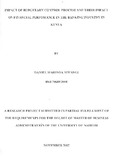| dc.description.abstract | Budgetary control and Financial Management have been at the core of economic reform programs in most nations around the world. Locally, several studies have been conducted on budgetary control in Kenyan organizations. Due to the mandate charged to it on observing budgetary issues in banking industry, challenges facing budgetary control would be well identified by focusing on this organization. This scenario presents a challenge in its budgetary process, and which is the focus of the study. No study has been done on budgetary control in the banking industry. The objective of the study was to examine the impact of budgetary control process in the banking industry in Kenya.
This study was descriptive in nature and the researcher used survey method. The population of this study was 44 commercial banks in Kenya. This is the group from which the sample was drawn. The main instrument in Data collection was through semi-structured questionnaires which were dropped and picked later or e-mailed to the respondents. The completed questionnaires were edited for completeness and consistency. A content analysis and descriptive analysis was employed. The content analysis was used to analyze the respondents’ views about the factors affecting budgeting process. The data was then coded to enable the responses to be grouped into categories. Pie charts, tables, graphs were used as appropriate to present the data collected for ease of understanding and analysis.
It was found out that departments participated in budgetary control process. Budgetary control affects the financial performance of the organizations and that financial performance of the organization is affected by budgetary control process to a very great extent. Since departments
v
participate in budgetary control process, the organizations should use budgets to motivate employees to do better, forecast the future, to assist in control, as a means by which management communicates to other levels of department and as a means of performance appraisal.
The study found that continuance commitment concerns an individual’s need to continue working for the organization based on the perceived costs associated with leaving the organization to a very great extent, budgetary participation can be seen as interventions to increase organizational commitment and consequently firm performance. The absence of organizational commitment leads to low rates of employee participation, psychological withdrawal manifested in lower degrees of personal investment and poor risk-taking behavior and that performance improves if organizations move away from traditional control oriented approach to a commitment-oriented approach to managing people to a great extent.
The study further recommends continued commitment so that an individual’s need to continue working for the organization based on the perceived costs associated with leaving the organization; preparation of centralized budgets well checked for errors of either overestimation or underestimation to reduce budget accuracy challenges and shortening the duration of the bargaining and negotiations to reduce budget inaccuracy in the organization | en_US |

